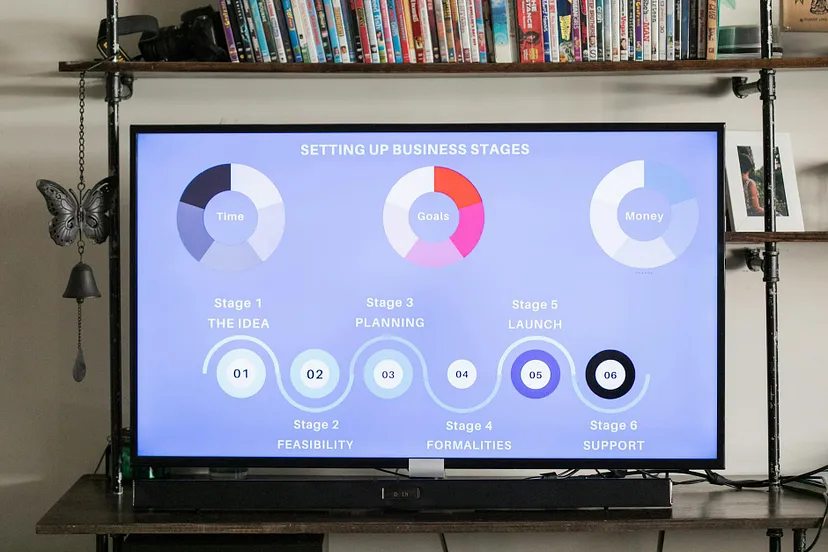Are you looking for a fresh way to connect with your audience and boost your brand’s visibility? 🎙️ Podcasting might just be the game-changer your business needs. In a world where content is king, podcasts have emerged as a powerful medium to engage listeners, establish authority, and drive growth.
But why should your business jump on the podcasting bandwagon? And more importantly, how do you get started? Whether you’re a small startup or an established corporation, the world of podcasting offers exciting opportunities to amplify your message and reach new heights. From choosing the right format to selecting essential equipment, we’ll guide you through every step of launching a successful business podcast.
Ready to unlock the potential of audio content for your brand? Let’s dive into the benefits of podcasting for business and explore how you can create, promote, and even monetize your very own podcast. Get ready to give your audience something to talk about! 🚀
Benefits of Podcasting for Business

A. Reach a wider audience
Podcasting opens up a new channel to connect with potential customers who prefer audio content. With the rising popularity of podcasts, your business can tap into a vast and growing audience. Here’s how podcasting helps you reach a wider audience:
- Convenience: Listeners can consume your content while multitasking
- Accessibility: Available on various platforms and devices
- Discoverability: Podcast directories and search engines enhance visibility
B. Establish thought leadership
By sharing valuable insights and expertise through your podcast, you position your business as an industry authority. This helps in
- Building credibility and trust with your audience
- Showcasing your knowledge and experience
- Attracting potential clients and partners
C. Build stronger customer relationships
Podcasting allows for a more personal and intimate connection with your audience. This fosters stronger customer relationships by:
- Creating a sense of community around your brand
- Providing value through educational or entertaining content
- Encouraging listener engagement and feedback
D. Cost-effective marketing tool
Compared to traditional marketing methods, podcasting offers a cost-effective way to promote your business:
By leveraging podcasting, businesses can achieve multiple marketing objectives while keeping costs under control. This makes it an attractive option for companies of all sizes looking to expand their reach and influence.
Choosing Your Podcast Format

A. Solo shows
Solo shows are a popular podcast format where a single host delivers content directly to the audience. This format offers several advantages:
- Complete control over content and direction
- Easier scheduling and production
- Opportunity to build a strong personal brand
However, solo shows can be challenging to maintain consistently engaging content without guest input.
B. Interview-style episodes
Interview-style podcasts feature conversations between the host and guests, offering:
- Diverse perspectives and expertise
- Built-in audience from guest’s following
- Natural, conversational flow
To succeed with this format, hosts must develop strong interviewing skills and consistently secure interesting guests.
C. Panel discussions
Panel discussions involve multiple participants discussing a topic, providing:
- Dynamic, multi-faceted conversations
- Opportunity for debate and varied viewpoints
- Engaging content for listeners
D. Storytelling format
Storytelling podcasts focus on narrative-driven content, offering:
- Immersive listener experience
- Opportunity for creative expression
- Potential for serialised content
This format requires strong writing and narrative skills to maintain audience engagement.
E. Mixed approach
A mixed approach combines elements from different formats, allowing for:
- Variety in content delivery
- Flexibility to adapt to different topics
- Ability to cater to diverse listener preferences
When choosing your podcast format, consider:
- Your strengths as a host
- Available resources and time
- Target audience preferences
- Long-term sustainability
By selecting the right format, you’ll set a strong foundation for your business podcast’s success.
Essential Equipment for Podcasting

A. Microphones
When it comes to podcasting, the quality of your microphone can make or break your show. Here are some top microphone options for different budgets and needs:
- Entry-level: Audio-Technica ATR2100x-USB
- Mid-range: Blue Yeti USB Microphone
- Professional: Shure SM7B
B. Recording software
Choosing the right recording software is crucial for capturing high-quality audio. Some popular options include:
- Audacity (free, open-source)
- GarageBand (free for Mac users)
- Adobe Audition (paid, professional-grade)
C. Editing tools
After recording, you’ll need reliable editing tools to polish your podcast. Consider these options:
- Hindenburg Journalist (user-friendly, podcast-specific)
- Reaper (affordable, powerful)
- Pro Tools (industry-standard, advanced features)
D. Hosting platform
Finally, you’ll need a hosting platform to distribute your podcast. Some top choices include:
- Libsyn (reliable, scalable)
- Buzzsprout (user-friendly, great analytics)
- Anchor (free, integrated with Spotify)
When selecting a hosting platform, consider factors like storage capacity, bandwidth limits, and integration with popular podcast directories.
Planning Your Podcast Content

Identify your target audience
Before diving into content creation, it’s crucial to understand who you’re speaking to. Identifying your target audience helps tailor your podcast to their interests and needs. Consider the following factors:
- Demographics (age, gender, location)
- Industry or profession
- Pain points and challenges
- Interests and preferences
Create a listener persona to guide your content strategy:
Develop a content calendar
A well-planned content calendar ensures consistency and helps you stay organized. Here’s how to create one:
- Brainstorm episode ideas
- Align topics with your audience’s interests
- Plan for seasonal or timely content
- Schedule guest appearances
- Balance educational and entertaining content
Create engaging episode titles
Craft titles that grab attention and clearly communicate the value of your episode:
- Use numbers or lists (e.g., “5 Ways to Boost Your SEO”)
- Include power words (e.g., “essential,” “ultimate,” “secrets”)
- Ask intriguing questions (e.g., “Is Your Marketing Strategy Outdated?”)
- Incorporate your target keywords naturally
Prepare show notes
Comprehensive show notes enhance the listener experience and boost SEO:
- Summarize key points
- Include timestamps for easy navigation
- List resources mentioned in the episode
- Add a call-to-action (CTA) for listener engagement
Now that you’ve planned your content, the next step is to bring it to life through recording and editing.
Recording and Editing Your Podcast

Set up your recording space
Creating an ideal recording environment is crucial for producing high-quality podcast content. Here are some key considerations:
- Sound isolation: Choose a quiet room with minimal external noise
- Acoustic treatment: Use sound-absorbing materials to reduce echo
- Equipment placement: Position microphones and other gear for optimal performance
Conduct a sound check
Before recording, always perform a thorough sound check:
- Test each microphone individually
- Adjust input levels to prevent distortion
- Listen for any background noise or interference
- Check headphone levels for all participants
Record your episodes
When recording, keep these best practices in mind:
- Maintain consistent distance from the microphone
- Use a pop filter to reduce plosive sounds
- Monitor audio levels throughout the recording
- Take breaks if needed to maintain energy and focus
Edit for clarity and flow
Post-recording, editing is essential for a polished final product:
- Remove unnecessary pauses and filler words
- Adjust audio levels for consistency
- Add intro/outro music and sound effects
- Ensure smooth transitions between segments
Remember, the goal is to create a seamless listening experience that engages your audience and represents your business professionally. With practice, your recording and editing skills will improve, leading to higher-quality podcast content that resonates with your listeners.
Promoting Your Business Podcast

Leverage social media platforms
Social media is a powerful tool for promoting your business podcast. Here’s how to effectively use different platforms:
- Twitter: Share episode snippets and engage with listeners
- Instagram: Post eye-catching audiograms and behind-the-scenes content
- LinkedIn: Share industry insights and connect with professionals
- Facebook: Create a dedicated page and join relevant groups
Collaborate with other podcasters
Collaboration can significantly expand your podcast’s reach:
- Guest appearances on other shows
- Cross-promotion with complementary podcasts
- Joint episodes or series with industry partners
- Attending podcasting events and networking
Submit to podcast directories
Ensure maximum visibility by submitting your podcast to popular directories:
Apple Podcasts-Largest listener base
Spotify-Growing podcast platform
Google Podcasts
Android user reach
Repurpose content for other channels
Maximize your podcast’s impact by repurposing content:
- Create blog posts from episode transcripts
- Design infographics highlighting key points
- Develop short video clips for YouTube and TikTok
- Write LinkedIn articles based on podcast topics
By implementing these strategies, you’ll increase your podcast’s visibility and attract more listeners to your business content. Remember to consistently analyze your promotional efforts and adjust your approach based on what resonates most with your audience. With persistence and creativity, your business podcast can become a powerful tool for brand awareness and audience engagement.
Monetising Your Podcast

Sponsorships and advertising
Sponsorships and advertising are powerful ways to monetize your business podcast. Brands are often eager to reach engaged audiences, making your podcast an attractive platform. Start by approaching companies whose products or services align with your podcast’s theme and audience demographics.
Premium content offerings
Offer exclusive content to your most dedicated listeners through a subscription model. This could include:
- Ad-free episodes
- Extended interviews
- Behind-the-scenes content
- Early access to episodes
Cross-promote your products or services
Leverage your podcast to showcase your business offerings. Discuss your products or services naturally within the context of your episodes, providing value to listeners while subtly promoting your business.
Affiliate marketing opportunities
Partner with relevant companies to promote their products or services using unique affiliate links. When your listeners make purchases through these links, you earn a commission.
- Choose products that genuinely benefit your audience
- Disclose affiliate relationships transparently
- Provide honest reviews and recommendations
By implementing these monetisation strategies, you can transform your business podcast from a marketing tool into a revenue-generating asset. Remember to balance monetisation efforts with delivering valuable content to maintain listener loyalty and engagement.

Podcasting offers a unique and powerful way for businesses to connect with their audience, establish authority, and drive growth. By leveraging the benefits of audio content, choosing the right format, and investing in quality equipment, you can create a compelling podcast that resonates with your target market. Remember to plan your content strategically, master the art of recording and editing, and implement effective promotion strategies to maximize your podcast’s reach and impact.
As you embark on your podcasting journey, don’t forget to explore monetization opportunities that align with your business goals. Whether through sponsorships, affiliate marketing, or promoting your own products and services, a well-executed podcast can become a valuable asset to your overall marketing strategy. Start your podcast today and unlock new possibilities for your business’s success in the digital age.




Lectus ante pretium ridiculus viverra pellentesque, faucibus viverra. Leo odio porttitor mi at vel urna nostra. Praesent habitasse tempus; eu potenti ultricies natoque suscipit faucibus eros.